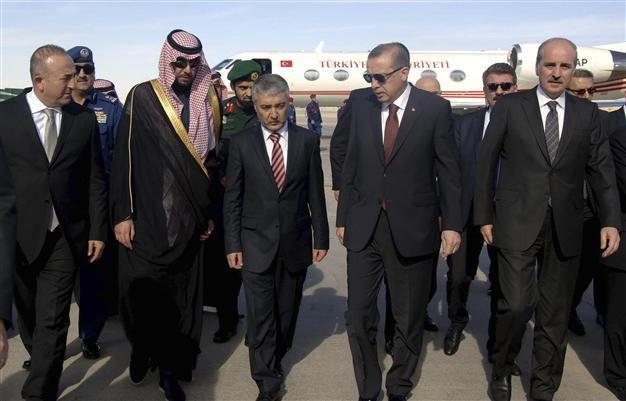Turkish president cuts Africa trip to attend Saudi King Abdullah’s funeral
RIYADH

Turkey's President Tayyip Erdoğan (front 2nd R) arrives to take part in the funeral of Saudi King Abdullah bin Abdulaziz in Riyadh January 23, 2015. REUTERS Photo
Foreign leaders gathered in a cavernous mosque in the Saudi Arabian capital on Jan. 23 for the funeral of King Abdullah.Turkish President Recep Tayyip Erdoğan, Pakistani Prime Minister Nawaz Sharif and the leaders of Sudan and Ethiopia joined Gulf rulers for the funeral prayer at Riyadh's Imam Turki bin Abdullah mosque.
Erdoğan said he has postponed his planned trip to Somalia to attend the funeral of Saudi Arabia's King Abdullah, a day after a bomb targeted a Turkish delegation in the capital Mogadishu.
"We've decided to go [to Riyadh] and are heading there now. But we are also going to continue our programme and go to Djibouti and Somalia," Erdoğan told reporters in comments broadcast live by state television TRT.
Erdoğan said he will travel to Djibouti after the funeral, and sources in his office said the Turkish leader is expected to go to Somalia on Jan. 25.
"It's just a postponement. He will be coming to Somalia after the funeral but we don't know the exact date or the time," Daud Aweis, spokesman for the Somali presidency, told Reuters.
A suicide bomber on Thursday rammed a car laden with explosives into the gate of a Mogadishu hotel where Turkish and Somali delegates were meeting, killing two security guards.
The foreign leaders prayed alongside Abdullah's successor and half-brother, King Salman.
Television pictures showed Abdullah's covered body borne on a simple litter carried by members of the royal family wearing traditional red-and-white checked shemagh headgear, following prayers.
Prince Miteb bin Abdullah, the National Guard minister and a son of the late king, was among the litter-bearers.
The body was quickly moved to nearby El-Ud public cemetery.
In keeping with the kingdom's strict Muslim traditions, he was to be buried in an unmarked grave as was his predecessor King Fahd, who died in 2005.
Bahrain's King Hamad, Qatari Emir Sheikh Tamim Bin Hamad al-Thani, a high-level delegation from the United Arab Emirates, and Kuwait's Emir Sheikh Sabah al-Ahmad al-Sabah were among other leaders at the funeral which followed the ailing Abdullah's death, at the age of about 90, early Friday.
US President Barack Obama was quick to pay tribute to Abdullah as a valued ally.
"As our countries worked together to confront many challenges, I always valued King Abdullah's perspective and appreciated our genuine and warm friendship," Obama said in a written statement shortly after the monarch's death.
"The closeness and strength of the partnership between our two countries is part of King Abdullah's legacy."
Other tributes came in from Japan, India and France, whose President Francois Hollande hailed Abdullah as "a statesman whose work profoundly marked the history of his country."
Hollande will travel to Saudi Arabia to "offer his condolences" over King Abdullah's death, the presidency said Friday. The Elysee palace added that the exact timing of the trip had yet to be decided.
Israel's former president Shimon Peres said the death of King Abdullah was "a real loss for the peace of the Middle East".
"He was an experienced leader and a wise king. He had the courage ... to stand up and introduce a peace programme for the Middle East," said Peres, referring to the 2002 Arab Peace Initiative.
Iran offered condolences Friday to the people and government of Saudi Arabia upon the death of King Abdullah and said Foreign Minister Mohammad Javad Zarif would travel to Riyadh.
In a statement on its foreign ministry website, Iran said Zarif "will take part in an official ceremony" in the Saudi capital on Saturday, without giving further details.
Islamic militants celebrate Saudi king's death online
BEIRUT - Associated Press
Abdullah, who died at the age of 90, began battling al-Qaida militants around a decade ago when extremists launched a string of attacks in the kingdom aimed at toppling the monarchy. Backed by the kingdom's top ally, the United States, Saudi officials responded with a massive crackdown and has imprisoned suspected militants and sentenced others to death.
Many Islamic extremists consider the Saudi royal family to be corrupt. The Islamic State of Iraq and the Levant (ISIL), an al-Qaida breakaway group that currently holds a third of Iraq and Syria, often cites Islam's holiest city of Mecca in Saudi Arabia, as one of its targets. Saudi Arabia is also part of a U.S.-led coalition targeting the ISIL in airstrikes.
A man who identifies himself as an ISIL supporter who uses the name Abu Azzam al-Najdi criticized the late king on Twitter, saying: "He sent his warplanes to kill Muslims in (Syria). He imprisoned Muslim men and women and wherever there was a war against jihadis, he was the first."
Some loyalists of al-Qaida and the ISIL also used a hashtag that translate from Arabic into "Death of a Tyrant."
Social media provides a forum for militants and their supporters to air their statements and propaganda videos. Such users typically do not give their full names, if at all, using instead nicknames and pseudonyms.
A jihadi supporter who identifies himself by the name of Omar wrote in English: "The dog that was occupying (the land of the two holy shrines) has finally kicked the bucket, no Bush or Obama to save you from Allah."
One user posted a photo illustration of King Abdullah wearing an orange uniform as a masked man stood behind him carrying a knife to behead him.
"We don't want him to die. We want to slaughter him this way," the post said, referring to Saudi Arabia's tradition of beheading criminals.
















